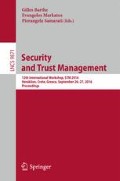Abstract
Software engineering and information security have traditionally followed divergent paths but lately some efforts have been made to consider security from the early phases of the Software Development Life Cycle (SDLC). This paper follows this line and concentrates on the incorporation of trust negotiations during the requirements engineering phase. More precisely, we provide an extension to the SI* modelling language, which is further formalised using Answer Set Programming specifications to support the automatic verification of the model and the detection of privacy conflicts caused by trust negotiations.
Access this chapter
Tax calculation will be finalised at checkout
Purchases are for personal use only
Notes
- 1.
N.B. That we assume that the goal is always common. The consideration of different goals is out of the scope of the paper.
- 2.
The notion of actor is inherited from i* and is used only when it is not necessary to distinguish between the concepts of agent and role.
- 3.
Note that pentagons point to the party whose information is being demanded.
- 4.
Actors are used for simplicity but the actual predicates and rules should consider roles and agents as arguments.
- 5.
We use the \(\succeq \) symbol to compare ordinal values: \(High \succ Medium \succ Low\).
References
Asnar, Y., Li, T., Massacci, F., Paci, F.: Computer aided threat identification. In: 13th IEEE Conference on Commerce and Enterprise Computing, pp. 145–152 (2011)
Brewka, G., Eiter, T., Truszczyński, M.: Answer set programming at a glance. Commun. ACM 54(12), 92–103 (2011)
Castro, J., Giorgini, P., Kolp, M., Mylopoulos, J.: Tropos: a requirements-driven methodology for agent-oriented software. In: Henderson-Sellers, B., Giorgini, P. (eds.) Agent-Oriented Methodologies. Idea Group, Hershey (2005)
Deng, M., Wuyts, K., Scandariato, R., Preneel, B., Joosen, W.: A privacy threat analysis framework: supporting the elicitation and fulfillment of privacy requirements. Requir. Eng. 16(1), 3–32 (2011)
Kalloniatis, C., Kavakli, E., Gritzalis, S.: Addressing privacy requirements in system design: the PriS method. Requir. Eng. 13, 241–255 (2008)
Massacci, F., Mylopoulos, J., Zannone, N.: Security requirements engineering: the SI* modeling language and the secure tropos methodology. In: Ras, Z.W., Tsay, L.-S. (eds.) Advances in Intelligent Information Systems. SCI, vol. 265, pp. 147–174. Springer, Heidelberg (2010)
Mouratidis, H., GiorginiI, P.: Secure tropos: a security-oriented extension of the tropos methodology. Int. J. Softw. Eng. Know. 17(02), 285–309 (2007)
Notario, N., Crespo, A., Martín, Y., del Álamo, J.M., Métayer, D.L., Antignac, T., Kung, A., Kroener, I., Wright, D.: PRIPARE: integrating privacy best practices into a privacy engineering methodology. In: International Workshop on Privacy, Engineering, pp. 151–158 (2015)
Paci, F., Fernandez-Gago, C., Moyano, F.: Detecting insider threats: a trust-aware framework. In: 8th International Conference on Availability, Reliability and Security (ARES), pp. 121–130, September 2013
Paja, E., Dalpiaz, F., Giorgini, P.: Modelling and reasoning about security requirements in socio-technical systems. Data Knowl. Eng. 98, 123–143 (2015)
Squicciarini, A., Bertino, E., Ferrari, E., Paci, F., Thuraisingham, B.: PP-Trust-X: a system for privacy preserving trust negotiations. ACM Trans. Inf. Syst. Secur. 10(3), 1–50 (2007)
van Lamsweerde, A.: Elaborating security requirements by construction of intentional anti-models. In: 26th International Conference on Software Engineering, ICSE 2004, pp. 148–157. IEEE Computer Society, Washington, DC (2004)
van Lamsweerde, A., Letier, E.: Handling obstacles in goal-oriented requirements engineering. IEEE T Softw. Eng. 26(10), 978–1005 (2000)
van Lamsweerde, A., Darimont, R., Letier, E.: Managing conflicts in goal-driven requirements engineering. IEEE T Softw. Eng. 24(11), 908–926 (1998)
Winslett, M., Yu, T., Seamons, K.E., Hess, A., Jacobson, J., Jarvis, R., Smith, B., Yu, L.: Negotiating trust on the web. IEEE Internet Comput. 6(6), 30–37 (2002)
Yu, E.: Modelling strategic relationships for process reengineering. Ph.D thesis. University of Toronto, Canada (1996)
Acknowledgements
This work has been partially funded by the European Commission through the Marie Curie Training Network NeCS (H2020-MSCA-ITN-2015-675320), the Spanish Ministry of Economy and Competitiveness through PERSIST (TIN2013-41739-R) and PRECISE (TIN2014-54427-JIN), which is co-financed by FEDER.
Author information
Authors and Affiliations
Corresponding author
Editor information
Editors and Affiliations
Rights and permissions
Copyright information
© 2016 Springer International Publishing AG
About this paper
Cite this paper
Rios, R., Fernandez-Gago, C., Lopez, J. (2016). Privacy-Aware Trust Negotiation. In: Barthe, G., Markatos, E., Samarati, P. (eds) Security and Trust Management. STM 2016. Lecture Notes in Computer Science(), vol 9871. Springer, Cham. https://doi.org/10.1007/978-3-319-46598-2_7
Download citation
DOI: https://doi.org/10.1007/978-3-319-46598-2_7
Published:
Publisher Name: Springer, Cham
Print ISBN: 978-3-319-46597-5
Online ISBN: 978-3-319-46598-2
eBook Packages: Computer ScienceComputer Science (R0)

